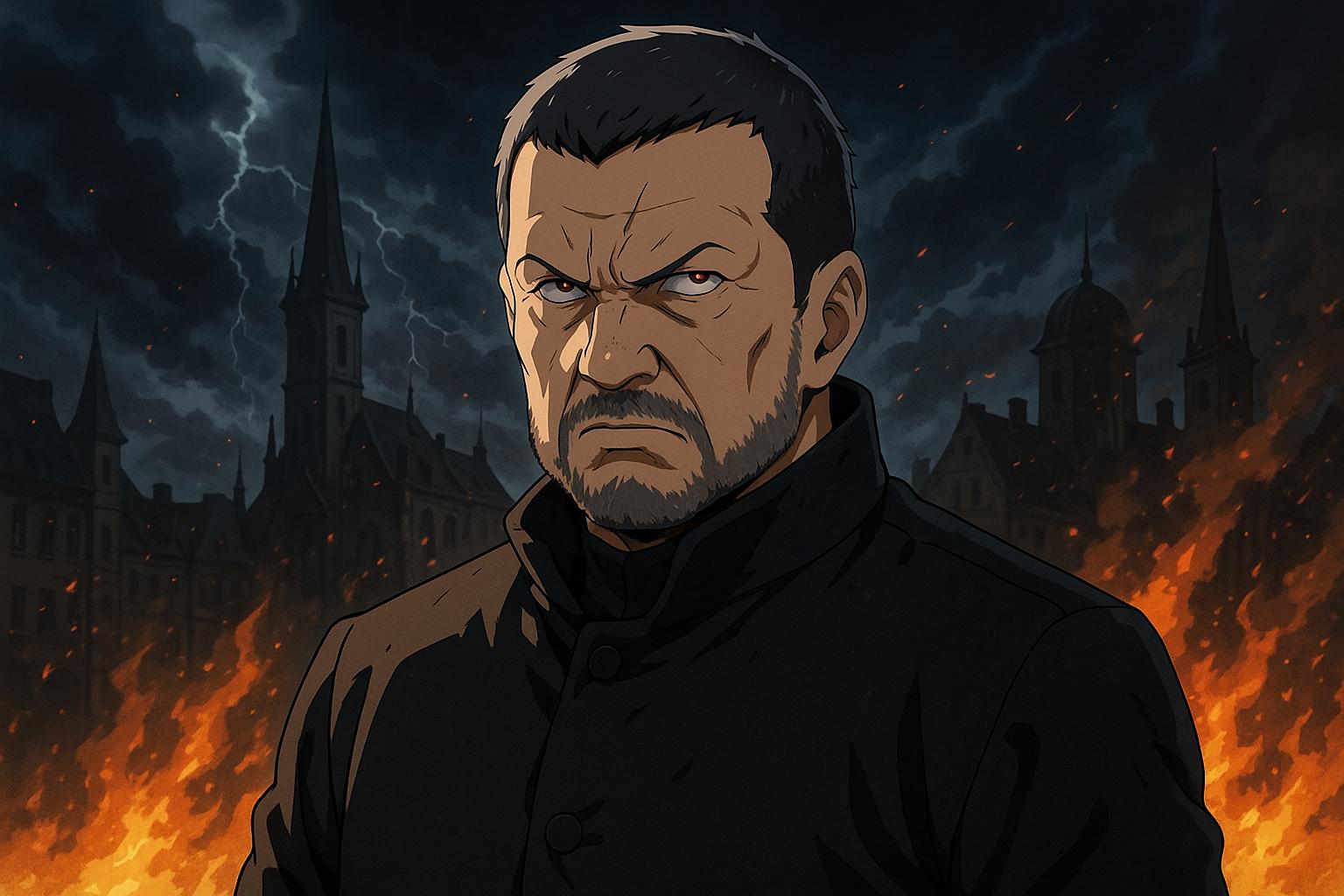Russian propagandist Vladimir Solovyov issues a stark warning to Europe of impending disaster as US-Russia tensions deepen over the Ukraine war, while Donald Trump’s plans for direct talks with Vladimir Putin raise fears of a diplomatic shift that could destabilise NATO and the region.
Vladimir Solovyov, a prominent Russian propagandist, has issued a chilling warning to Europe amidst the escalating tensions surrounding the conflict in Ukraine. Speaking with fervour on his television and radio platforms, he denounced Western interference, specifically targeting former President Donald Trump and his special envoy, Steve Witkoff. Solovyov claimed that the United States’ meddling in the war is futile, asserting, “They can’t win in the Ukrainian conflict, because anyone who understands Russia and Putin knows that during the entire existence of the Russian state, it was never possible to force any Russian government into a desired outcome.” He ominously stated, “This is Europe’s problem. Europe will burn down,” highlighting a narrative of impending disaster should Western powers continue their involvement.
This statement underscores a broader discourse among Russian officials who characterise Russia as being in an existential struggle against the West. Solovyov’s rhetoric suggests a future marked by conflict rather than resolution. He insists that the notion of peace is unattainable, framing the ongoing war in Ukraine as not merely a regional skirmish but as a manifestation of a deeper ideological divide—that of “good versus evil.” This perspective aligns with the Kremlin’s long-standing narrative that positions Russia as a besieged fortress, compelled to defend itself against a hostile West.
The recent exchanges between Trump and Putin highlight a significant pivot in the political landscape. Trump, who previously had a rapport with Putin, has described him as “absolutely crazy” for his military escalation in Ukraine, stating that “he is needlessly killing a lot of people.” Despite his criticisms, Trump has announced an intention to engage Putin in direct negotiations aimed at establishing a ceasefire, a move that has raised eyebrows among Ukraine’s leadership. Ukrainian President Volodymyr Zelenskyy, in particular, has expressed scepticism about Russia’s sincerity in pursuing peace, prompting concerns about the efficacy of such negotiations.
Critics of Trump argue that his approach could inadvertently validate Putin’s aggressive strategies, essentially undermining NATO and shifting the balance of power in favour of Russia. An opinion piece highlighted how this dynamic could destabilise international security, casting doubt on the credibility of NATO allies who rely on a collective defence strategy against potential threats.
As the geopolitical landscape continues to shift, Solovyov’s declarations, alongside Trump’s overtures towards dialogue, compound a complex environment fraught with potential pitfalls. The rhetoric emanating from both sides signals an enduring confrontation that could reshape not only European security but also global diplomatic relations in the years ahead. With Solovyov’s stark warning echoing through the corridors of power, the spectre of continued tension between Russia and the West looms large, threatening to engulf Europe in its perilous wake.
Reference Map:
Source: Noah Wire Services
- https://www.express.co.uk/news/world/2061837/russia-ww3-threat-europe-burn-down – Please view link – unable to able to access data
- https://www.newsweek.com/solovyov-putin-conflict-west-1885835 – Vladimir Solovyov, a prominent Russian propagandist, has predicted decades of confrontation between Russia and the West. He stated that the West views Russia as the main enemy, and that peace between good and evil is impossible. Solovyov’s rhetoric suggests a prolonged adversarial relationship, with Russia positioning itself as the righteous party in this conflict. His statements reflect the Kremlin’s narrative of ongoing hostility with Western nations, emphasizing the inevitability of continued tension and the impossibility of peaceful resolution.
- https://www.express.co.uk/news/world/1883947/russia-conflict-west-nazis-vladimir-putin-solovyov – Vladimir Solovyov, a key Russian propagandist, has warned of ‘decades of confrontation’ between Russia and the West. He argued that peace between good and evil is unattainable, positioning Russia as the righteous side in this ongoing conflict. Solovyov’s statements reflect the Kremlin’s narrative of enduring hostility with Western nations, emphasizing the inevitability of continued tension and the impossibility of peaceful resolution.
- https://www.theguardian.com/commentisfree/2025/feb/15/donald-trumps-betrayal-of-ukraine-has-emboldened-vladimir-putin-and-pulled-the-rug-from-under-nato-allies – An opinion piece in The Guardian criticizes President Donald Trump’s approach to the Ukraine conflict, suggesting that his actions have emboldened Russian President Vladimir Putin and undermined NATO allies. The article argues that Trump’s policies have weakened the Western alliance and shifted the balance of power in favour of Russia, highlighting the potential long-term consequences for international security and the credibility of NATO.
- https://www.wsls.com/news/world/2025/03/18/trump-and-putin-to-hold-call-on-ceasefire-but-zelenskyy-is-skeptical-that-russia-is-ready-for-peace/ – President Donald Trump and Russian President Vladimir Putin have agreed to hold a call to discuss a ceasefire in the Ukraine conflict. However, Ukrainian President Volodymyr Zelenskyy remains sceptical about Russia’s commitment to peace, expressing doubts over Moscow’s readiness to negotiate a genuine resolution to the ongoing war.
- https://www.pbs.org/newshour/politics/trump-says-he-and-putin-have-agreed-to-begin-negotiations-on-ending-ukraine-war – President Donald Trump announced that he and Russian President Vladimir Putin have agreed to begin negotiations aimed at ending the Ukraine war. This development marks a significant shift in U.S. policy, moving from support for Ukraine to direct engagement with Russia to seek a resolution to the conflict.
- https://www.theguardian.com/us-news/2025/mar/09/trump-ukraine-russia-explainer – An article in The Guardian outlines President Donald Trump’s recent actions regarding the Ukraine conflict, including his call with Russian President Vladimir Putin to initiate negotiations. The piece provides a timeline of events, highlighting the shift in U.S. foreign policy and the implications for international relations and the ongoing war in Ukraine.













